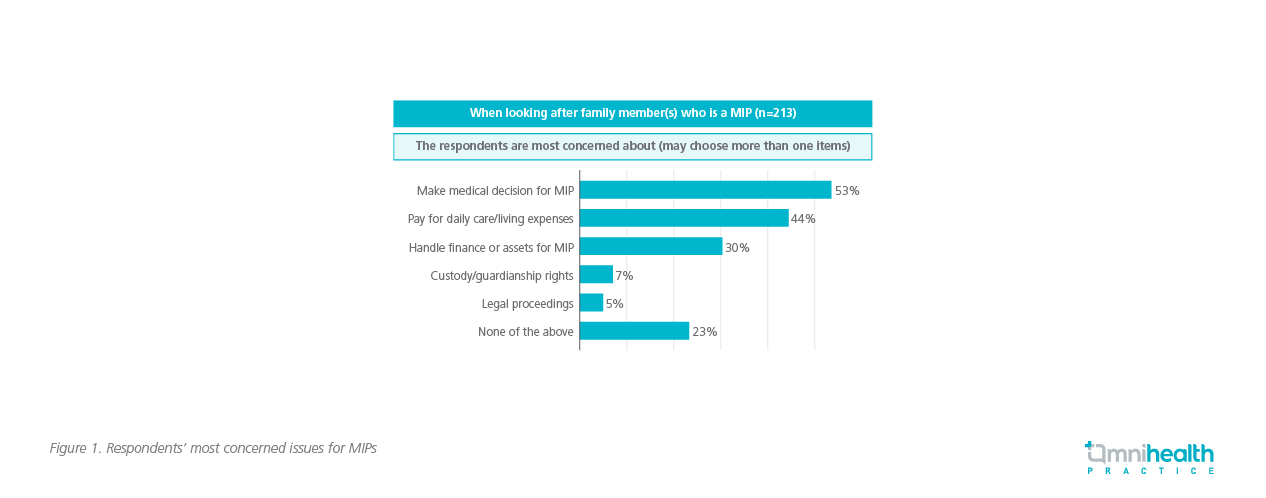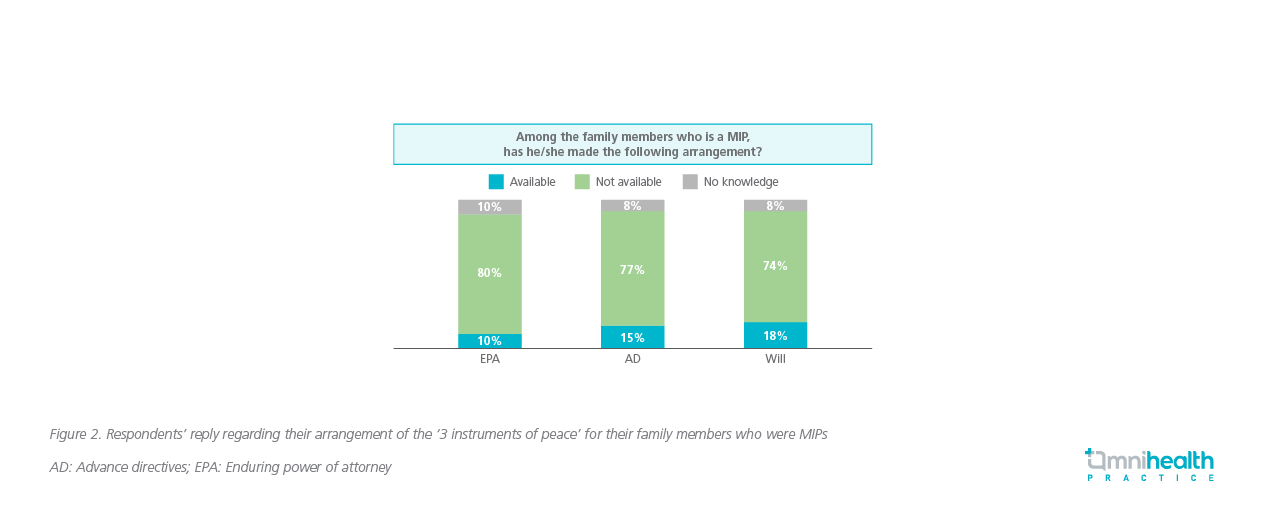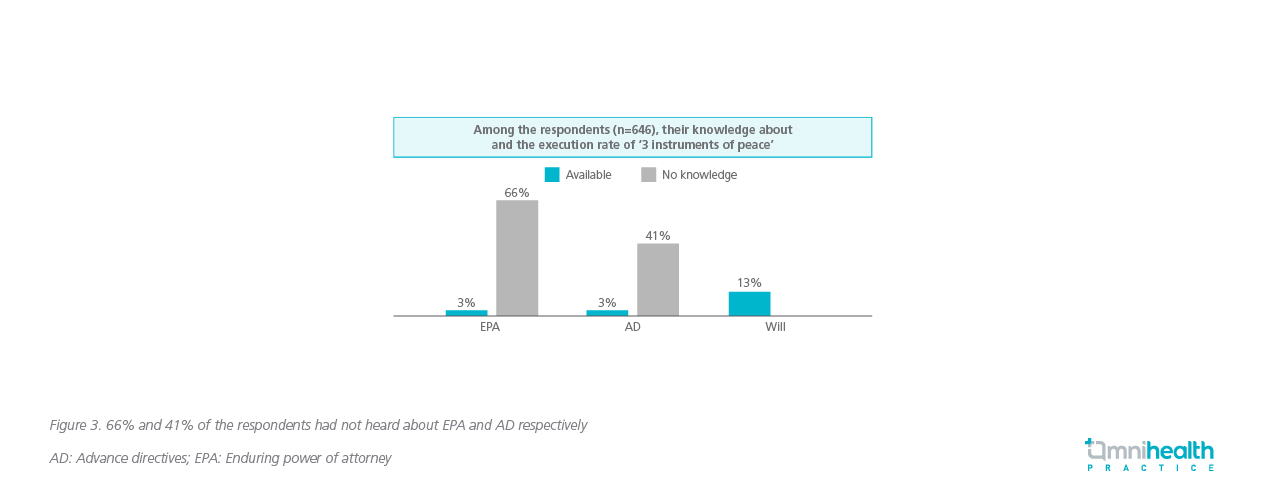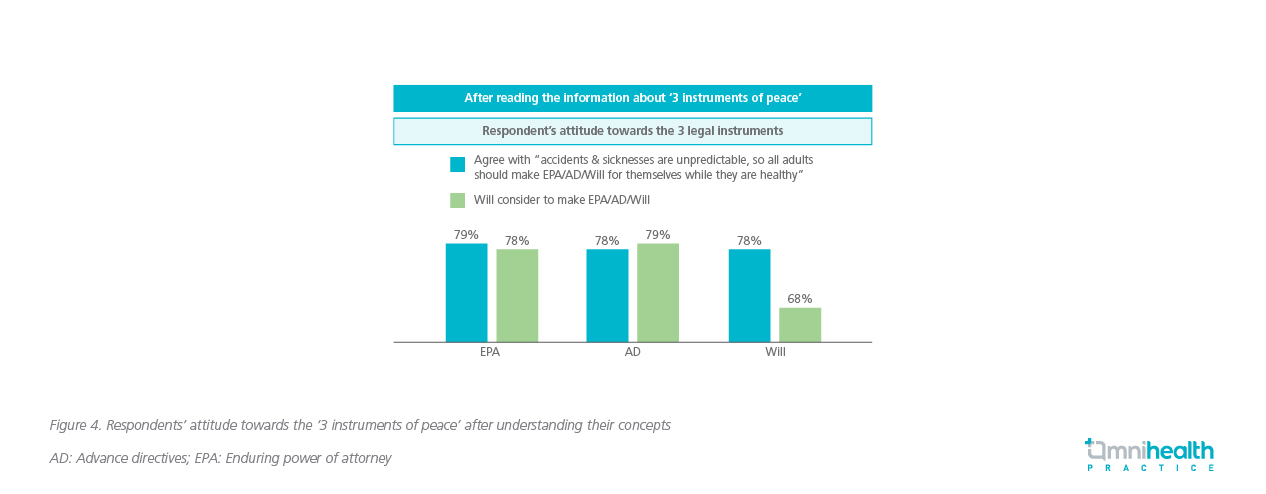EXPERT INSIGHT
Mental incapacity: Prepare and protect while still capable, don’t wait till it is regrettable
In routine clinical practice, a treatment decision can only legally proceed after patients are adequately informed and have voluntarily granted their consent for said decision.1,2 However, in patients whose mental capacity are compromised, a decision made on their behalf from an unauthorized third party may have legal, practical, or ethical repercussions especially when rapid treatment decisions are required.1,2 In a recent interview with Omnihealth Practice, Dr. Jess Leung brought out the issues encountered by persons without decision-making capacity (i.e., also known as mentally incapacitated persons, MIPs) and their carers. As everyone has a risk of losing their mental capacity, Dr. Leung called for earlier preparation by introducing the enduring power of attorney (EPA), advance directives (AD) and will, collectively known as the ‘3 instruments of peace (平安三寶)', to protect our interests while we are still mentally sound.
The general concept of mental capacity
Legally, all individuals are presumed to have the mental capacity to make a decision unless they are assessed by the clinicians to be unable to comprehend, retain, or make use of the information pertinent to making decisions, or are unable to communicate the decision.1 However, mental capacity is a decision/task, time and situation-specific concept.1,2 An individual who does not have the capacity to make one decision may be capable in making another based on the complexity of the decision and its associated risks and benefits, meaning that different levels of capacity are required for different types of activities.1
While not being considered an illness, mental capacity can result from various causes or risk factors that are classified into 2 main categories, namely neurodevelopmental disorders and acquired brain injuries.3 The former category describes conditions present at birth or early childhood that impair learning ability and handling of daily tasks, with example disorders such as Down syndrome, autism, cerebral palsy, and prenatal or neonatal infection of the central nervous system or drug poisoning.3 The latter depicts any kind of adulthood traumatic brain injury, neurological disorders including but not limited to car accidents, stroke, dementia, hypoxic brain, and severe mental illnesses.3
Despite a prevalence of >40% among acutely ill inpatients in medical wards, mental incapacity remains rarely recognized in clinical practice. In a study published in the Lancet, out of the 50 patients who were certified to have mental incapacity by the study investigators, only 12 (24%) of them were judged to be lacking mental capacity by the clinical teams.1 While a screening program for cognitive impairment is recommended by the investigators to help identify suspected cases, Hong Kong thus far has no such kind of services that constitutes a worrisome situation.1 Yet, if security measures are not taken while the person is still mentally healthy, huge challenges such as daily inconvenience, domestic conflicts and financial problems, etc., to both the MIPs themselves and their family members may emerge once the person eventually loses his/her mental capacity.
Local case sharing
The consequences of failing to make decisions as a result of mental incapacity can be complicated and extensive, as illustrated by the following cases.
Case 1
Mr. Chan is an 84-year-old gentleman residing with his elderly wife. He has three adult children, who are all married and living apart. He had not signed any AD in relation to medical treatment when he was mentally sound. Recently, he was diagnosed with terminal cancer and was hospitalized for fever and acute confusion. Further investigation revealed that he was suffering from multi-organ failure due to septicemia.
Due to Mr. Chan’s mentally incapacitated state, the case doctor discussed with his family members to confirm if any invasive procedures, including the use of ventilator, pacemakers, blood transfusion, and cardiopulmonary resuscitation, etc., should be performed. His family members have conflicting views on this issue. Where his wife and one of his children wanted to extend his life, whereas the other two children just hoped that their father can pass away without further suffering. Sadly, without a unanimous decision between his family members and a lack of an authorized decision maker, no clear direction for subsequent actions can be made for Mr. Chan.
Case 2
Mr. Wong is a 55-year-old merchant. He is married with 2 children who are studying in college and high school, respectively. He and his wife jointly own a company and 2 landed properties (one is selfoccupied) and have a few million dollars in their joint bank account which requires two-signature authentication. Apart from hypertension, Mr. Wong is generally healthy and neither smokes nor drinks. He is also covered by critical illness and medical insurance.
Mr. Wong collapsed and lost consciousness at home one night and was sent to the hospital immediately. He was diagnosed with hemorrhagic stroke and had gone through the critical period in the intensive care unit. After receiving 6-week in-patient rehabilitation treatment, Mr. Wong remained paralyzed on his right side and his language ability was grossly damaged. He became dependent on his family members in his basic daily living activities including eating, bathing, getting dressed, and toileting, etc.
Since Mr. Wong could not sign any insurance/legal documents and he had not created EPA before his stroke, no one could administer or manage his assets and property for the time being. As a result, Mr. Wong was unable to mobilize his finance to support his own medical fees as well as the education and living expenses for his family members.
Similar scenarios have been observed in other local MIP related cases where no resolution was reached. From clinical experience, existing clinical services are too disease-oriented and specialized towards healthcare professionals, and there is a general lack of all-rounded support from social workers and lawyers who are equally important in aiding the mentally incapacitated. For example, in the shared cases, a lawyer could help the MIP to apply for Part II of the Medical Health Ordinance (MHO) at the High Court to certify their state of mental incapacity and enable a committee to be appointed to manage their financial decisions.4 Similarly, a social worker can help apply guardianship orders to make healthcare decisions under the MHO to ensure that the patients’ interests/welfare are protected.5
MIP Care Resource Connect: A charity for the mentally incapacitated
Founded in 2019 by a group of diversified professionals encompassing medical experts, lawyers, bankers, educators, and patient carers, the MIP Care Resource Connect (MIPCRC) is a charitable organization that aims to deliver relevant knowledge and resources via a web-based platform to the carers and healthcare professionals taking care of the MIPs.6 In addition to complementing the clinical services, MIPCRC also aims to raise public awareness on the issues stemming from mental incapacity.6 As mental incapacity is often neglected by the public with little information available, MIPCRC also lists out other available organizations or social support groups to provide a pathway for the carers to obtain further information or seek additional support in terms of specific MIP-related services.6
Embracing the mission and vision to ‘CONNECT different parties and resources for the MIPs and their caregivers’, MIPCRC has provided a myriad of resources to MIPs and their families, including the introduction and education of various “preventive & protective” legal tools such as the ‘3 instruments of peace’, which are EPA, AD and will.6,7 Whereas an EPA is a legal document that allows owners to appoint an attorney on their behalf to manage their financial matters once they become mentally incapacitated in the future, an AD is a legal document to be signed in advance by owners to inform their treating physicians to provide life sustaining treatment or not once they become terminally ill or fail to make appropriate medical decisions.7 On the other hand, a will legally governs how the owners’ assets will be distributed after their death, regardless of the intestate inheritance law or the inheritors’ relationship to the owners.7
The common lack of preparation among MIPs and their families in Hong Kong
To capture the public’s understanding and attitude towards mental capacity and the ‘3 instruments of peace’, MIPCRC conducted a cross-sectional, 34 item, bilingual and self-rated online questionnaire survey with a sample size of 646 from July to September 2020.7 Through this questionnaire, MIPCRC aimed not only to raise the public awareness on mental capacity-related issues, but also to facilitate the early preparation of healthcare and financial planning for individuals.7
The study discovered that 45% of respondents were the breadwinners of their families, while 33% (n=213) had taken care of family members who were MIPs.7 The most common causes of mental incapacity were dementia, stroke and developmental disorders, accounting for 51%, 34% and 22% of the respondents, respectively.7 For those who needed to take care of MIPs, a majority of them (53%) were most concerned about making medical decisions for MIPs, while paying for daily care and living expenses (44%) and handling finance (30%) were the second and third most concerned matters, respectively (Figure 1).7 Nevertheless, more than 80% of the MIPs failed to arrange the ‘3 instruments of peace’ when they were mentally sound (Figure 2).7 Although 84% of the respondents had thought about the risk of losing decision-making capacity themselves one day, only a minority had prepared the ‘3 instruments of peace’, mainly due to their lack of knowledge in this regard where 66% and 41% of respondents had not heard about EPA and AD, respectively (Figure 3).7 Gladly, after explaining the concepts of the ‘3 instruments of peace’, 78%, 79% and 68% of the respondents would consider making EPA, AD and will, respectively (Figure 4).7




The general concept of mental capacity
The questionnaire signifies that the public’s understanding of the importance of mental capacity and the ‘3 instruments of peace’ is still weak and these instruments are under-utilized in Hong Kong. Reassuringly, at least 70-80% of respondents would consider these instruments when being adequately inculcated with, which may indicate that earlier education and more extensive information dissemination to the public and carers could in fact turn their negligence into vigilance.7 Clinicians, especially the general practitioners and specialists who look after patients with cognitive impairment, could play the role of an initial advocate as they know the patients and their family caregivers the best, and are often the most important source of healthcare information for the patients and their carers.8
As over 50% of the MIPs had dementia according to the survey, and that local prevalence data have projected that the number of patients aged 60 and above with dementia will skyrocket by 222% from approximately 103,000 in 2009 to over 332,000 in 2039, GP should keep much closer attention to this group of patients whenever they are encountered in daily practice.7,9 In a previous literature review, patients at early-stage dementia may retain the ability to state their wishes and express desire to participate in daily decision-making activities.10 Therefore, while these patients are still mentally sound even though are facing the risk of mental deterioration, a simple signature to direct them to MIP supporting services such as the MIPCRC website (mipcrc.org.hk), in addition to routine medical treatment, can help the patients and their carers become more aware of such issue and make timely preparation to best protect their interests in the future.
Not as common as dementia, children with developmental disorder are another group of vulnerable individuals who can easily fall prey to monetary fraud when their parents can no longer assist their asset management due to health problems or death one day. For this vulnerable group, MIPCRC is taking an active role in advising the Hong Kong Government on the setup of the “Special Needs Trust”, which is a pilot trust mechanism that seeks reliable trustees from the government or public organizations to provide financial planning and settle financial disputes at reasonable charges for those with special needs when their parents pass away.11
Conclusion
Overall, mental incapacity remains an underrecognized issue that should deserve more public attention to facilitate earlier preparation. Through the concerted efforts of clinicians, carers and social organizations such as the MIPCRC, it is believed that the mission of “To prepare when we are smart, and to protect when ones lose the decision-making capacity” (精靈時綢繆,老大不用愁) can be accomplished in Hong Kong.

